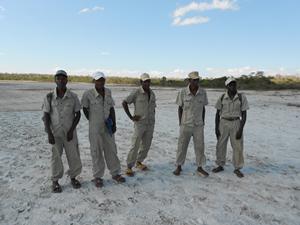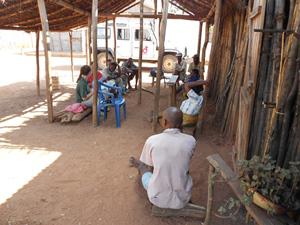Samantha Earle
The goal of this project is to understand the degree to which ecological monitoring involving local people in developing countries can meet dual conservation and development goals.

One monitoring team from Beroboka, Menabe.
An increasing number of conservation projects involve local people in ecological monitoring (also known as locally-based monitoring or participatory monitoring) as part of devolved management of Protected Areas (PAs). Despite the optimism and potential for a win-win solution, whereby PAs can provide benefits for local people whilst conserving species and habitats, these projects are difficult to implement successfully. This work grew out of the need to urgently understand the degree to which ecological monitoring involving local people can be effective and sustainable. In this context, effectiveness is the degree to which the data can inform managers and contribute to decision-making. Sustainability is the durability of the project in the long-term, which requires local people to feel that it is beneficial for them. Only if locally-based monitoring is both effective and sustainable will the approach have long-term leverage to support PA management.

Samantha talking to villagers in Kiboy, Menabe.
Durrell Wildlife Conservation Trust’s ecological monitoring project in Madagascar is supporting devolved management of PAs and will be used as the case study. The team consists of project leader and PhD student Samantha, plus three Malagasy research assistants. Over a six month period the team will visit 8-12 villages involved in Durrell’s monitoring project. A range of social science tools will be used to answer the following questions:
(1) What are the social and wellbeing impacts of the monitoring project in the local communities?
(2) Are there any perceived benefits of the project to local people, at an individual, household or community level?
(3) Are there any concerns about or barriers to the successful implementation of the project?
There are a range of outcomes at local and global scales. Firstly, this will provide new tools to the scientific and NGO community for rapid and low-cost assessment of social dynamics in local communities in which they are new Protected Area system. Further afield, in response to international treaties (such as the CBD, MDGs and UN- operating. Secondly, the results will significantly contribute to understanding the effectiveness and sustainability of involving local people in ecological monitoring as a way of managing Madagascar’s REDD+), an increasing number of countries are de-centralising the management of PAs to the local level. Therefore, this project will be relevant to a wide range of situations throughout the developing world at the interface between local people's livelihoods and conservation of species and habitats.